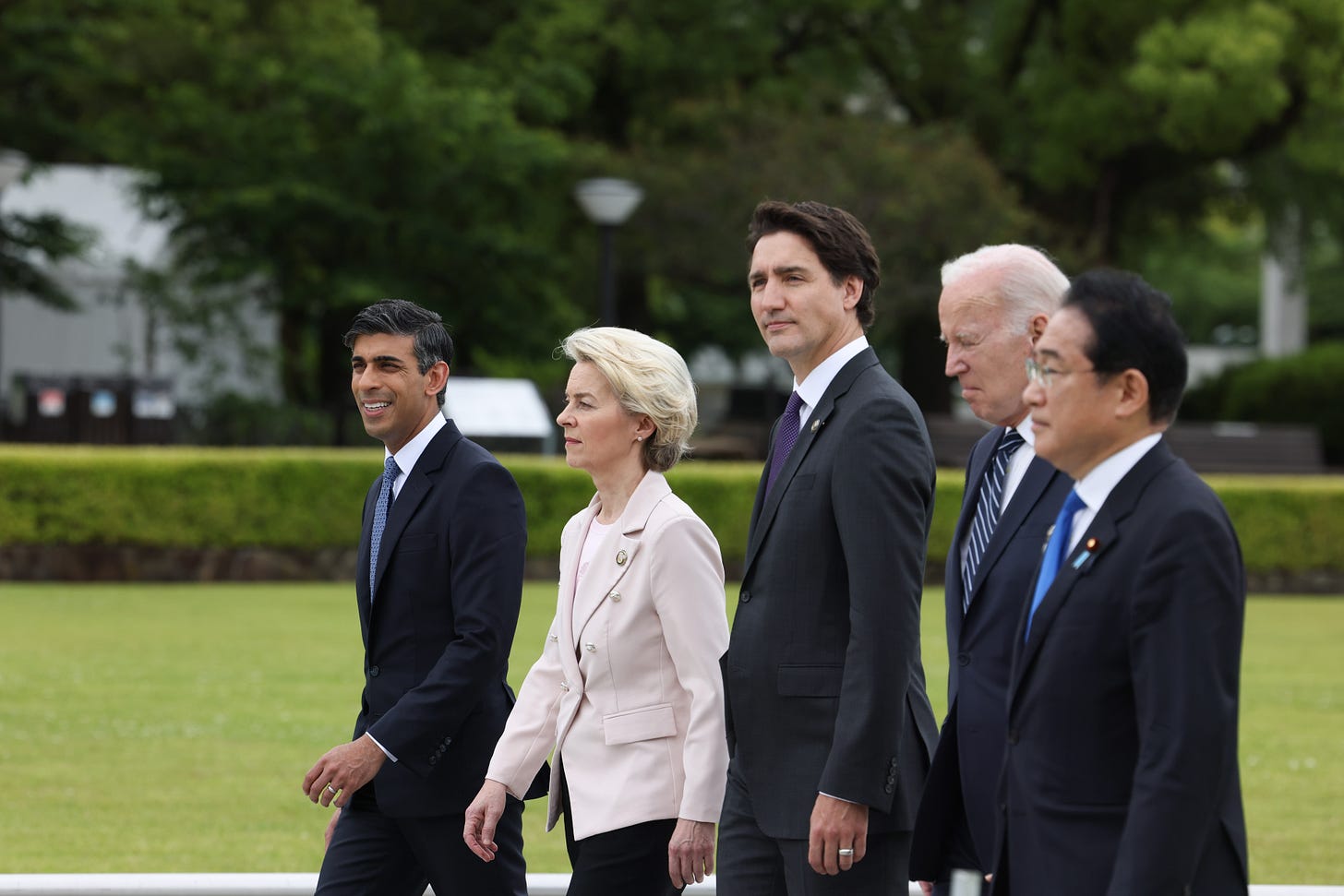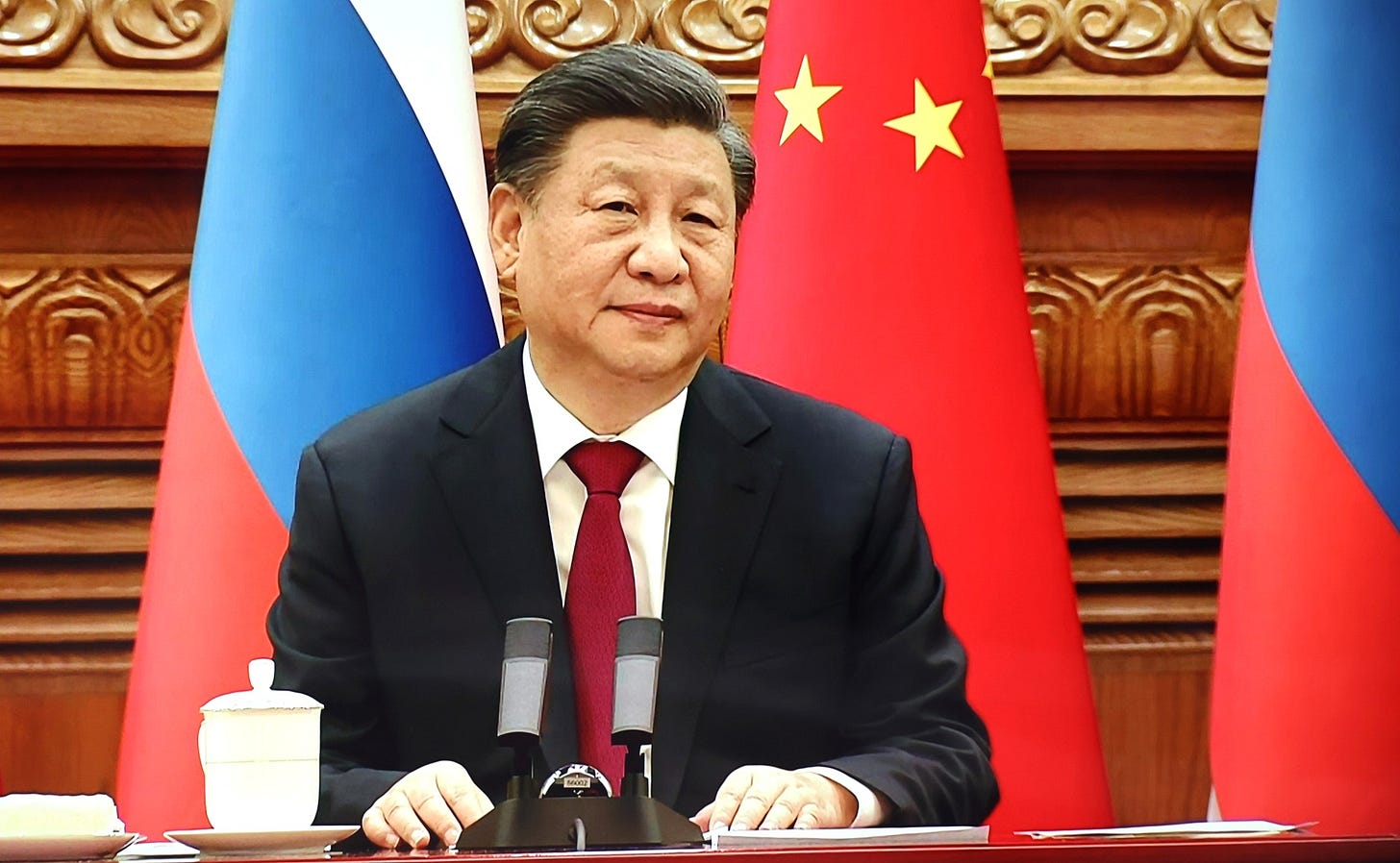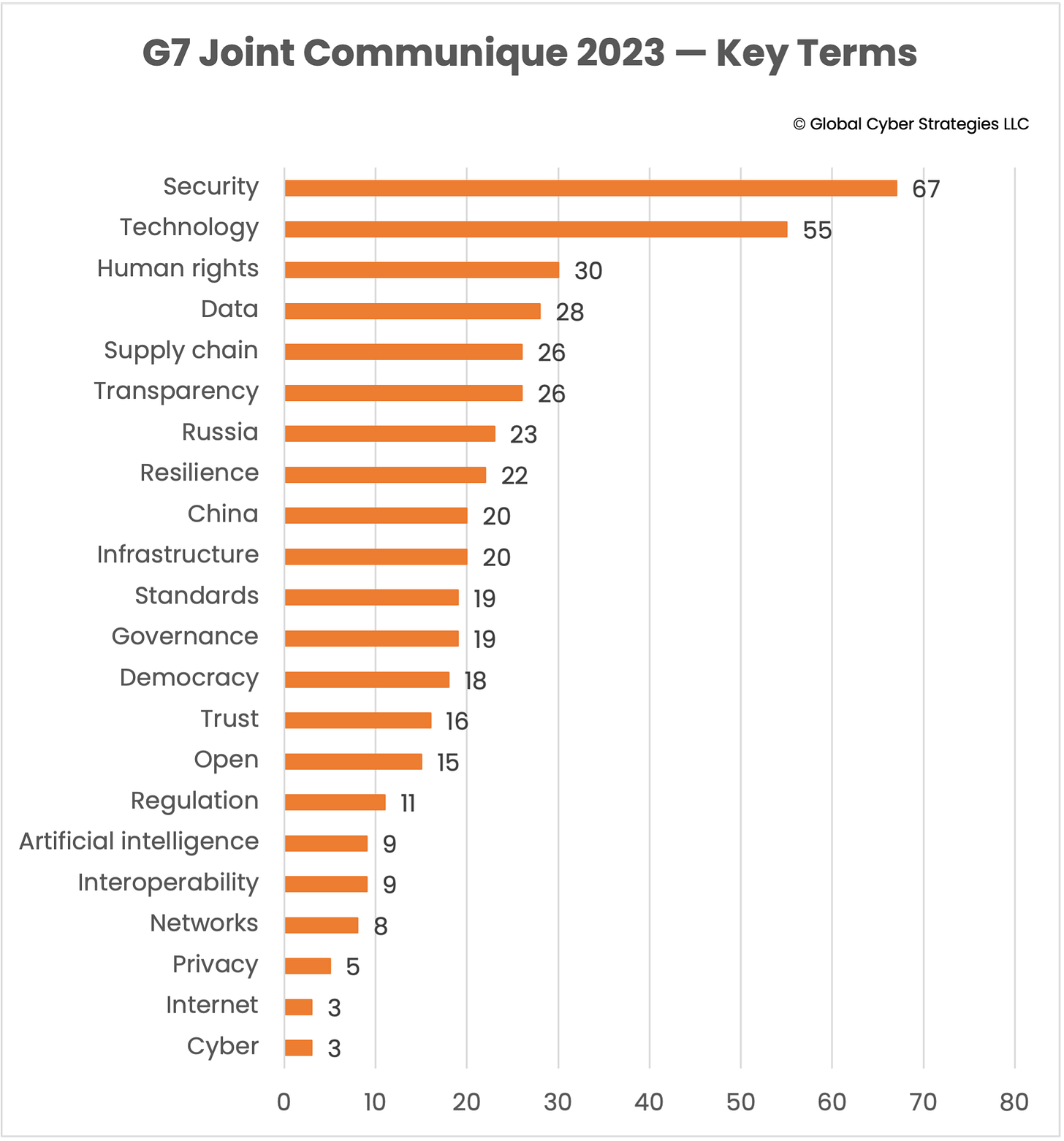Tech at the G7 2023: What Comes Next
The 2023 G7 summit had a considerable focus on tech. Here's what to know.

This past weekend, the G7 countries had their annual gathering — this year, in Hiroshima, Japan. Several countries not formally part of the G7 also attended. Here’s what to know about the discussion of technology issues at the summit, including via a data-driven analysis of the meeting read-outs. Brought to you by Global Cyber Strategies, a Washington, DC-based research and advisory firm.
The One-Liner
The 2023 G7 summit focused considerably on cross-border data flows and the concept of “Data Free Flow with Trust,” as well as issues like artificial intelligence regulation, digitalization, and privacy.
The Tech Foundation for the 2023 G7 Summit
Before the G7 summit this past weekend, the digital and technology ministers from the G7 countries — plus India, Indonesia, and Ukraine — met from April 29-30 to discuss tech issues. Representatives from the Economic Research Institute for ASEAN and East Asia, the United Nations, the International Telecommunication Union (ITU, the UN’s tech agency), the Organization for Economic Cooperation and Development (OECD), and the World Bank Group were also in attendance. The ministers’ 10-page readout from the meetings — formally, the ministerial declaration — had several key themes, including artificial intelligence, data, trust, infrastructure, and resilience.
One of the most frequently mentioned terms in the ministerial declaration was artificial intelligence (39 mentions). For example, the ministers highlighted the OECD’s AI principles and the need to both recognize G7 members’ varied AI approaches and promote interoperability between AI governance frameworks. They also stated that AI policies and regulations should be risk-based, forward-looking, and “human-centric and based on democratic values, including protection of human rights and fundamental freedoms and the protection of privacy and personal data.” Many factors associated with AI harms are not just about privacy, such as companies’ ownership of data processing infrastructure and the first-to-market advantages from quickly releasing technologies in a highly unregulated environment. But privacy is very much part of the picture. Companies, after all, gather immense volumes of data to train and test AI systems, and companies build most AI systems, such as large language models like ChatGPT, to collect enormous amounts of data from users. Privacy in the AI context was an important mention from the G7 tech ministers.
After AI, some of the other most frequently mentioned terms were data (31 mentions), trust (29 mentions), infrastructure (24 mentions), resilience (23 mentions), governance (18 mentions), networks (17 mentions), and internet (17 mentions). Also mentioned were human rights (15 mentions), interoperability (15 mentions), security (14 mentions), and democracy (13 mentions).
Importantly, as discussed in our analysis last week, ahead of the G7 summit, the G7 countries want to keep building out Japan’s “Data Free Flow with Trust” concept from 2019. India refused to sign on following its launch at the 2019 G20, but its supporters want to gain additional support and flesh the idea out further: promoting open data flows while leaving room for targeted guardrails. (Georgetown professor Anupam Chander pointed out on Twitter that the EU’s recent fine of Facebook and its broader implications for US-EU data transfers make this conversation even more urgent.) The mentions of democracy are likewise unsurprising. Several of the G7 members, especially the US, have been threading the language of “democracy” throughout many foreign policy initiatives and the language of “techno-democracy” throughout international tech engagements. It is taking more hold in these international forums.
What is surprising, though, is that security was mentioned only 14 times relative to mentions of trust, resilience, and governance. This may be a positive outcome, so as to not treat every tech issue as a security issue (which governments often do). Related, regulation was mentioned just 9 times compared to the 18 mentions of governance — suggesting the latter may be G7 countries’ preferred term. After all, they have some different views on how to regulate companies in social media, AI, and other areas.
Tech at the 2023 G7 Summit
This week’s past G7 summit included all G7 member countries: Canada, France, Germany, Italy, Japan, the United Kingdom, and the United States. The European Union attended as a guest (which is often the case) as well as India, Brazil, Indonesia, Vietnam, Australia, South Korea, Comoros Islands, and Cook Islands.
In the joint communique from the G7 members’ leaders, one of the most frequently mentioned terms was security (67 mentions). These mentions ranged from security in the military sense, as with Russia’s illegal war on Ukraine, to “food security,” “energy security,” “human security,” and the security of data and cloud infrastructure.
After that, some of the most frequently mentioned terms in the communique were technology (55 mentions), human rights (30 mentions), data (28 mentions), supply chain (26 mentions), and transparency (26 mentions). Russia was mentioned 23 times, and China was mentioned 20 times. On the technology front, the leaders reaffirmed their commitment to cross-border data flows while also recognizing “challenges related to privacy, data protection, intellectual property protection, and security including that of data and cloud infrastructure.” This has been an important policy evolution in the US and an important geopolitical shift internationally. Countries are no longer taking the open flow of data through the internet as a given, and they recognize that some protections, such as around privacy, may impede some data flows in some cases — but with broader gains for individuals and society. The leaders specifically endorsed the importance of the “Data Free Flow with Trust” concept:
…to enable trustworthy cross-border data flows and invigorate the digital economy as a whole, while preserving governments’ ability to address legitimate public interest.
Technology was discussed throughout the G7 session as well. Before day three of the summit, the White House held a background press call, attributed to a “senior administration official.” That person said:
… [we] are deepening our cooperation on economic security and resilience, which includes strengthening and diversifying our supply chains, launching a new coordination platform on economic coercion to develop early warnings to be able to deter and counter economic coercion, affirming the need to protect emerging technologies from being used to threaten our national security. And we all underscored, of course, that tools like targeted controls on outbound investment may be important as part of these efforts.
Diversifying supply chains and detecting economic coercion are unsurprising features of the US’ G7 discussions. The Biden administration has made clear its focus on promoting supply chain diversity — to avoid the kinds of medical equipment issues that arose during the Covid-19 pandemic, for instance, and to reduce the US’ semiconductor and technology dependence on China and regions potentially subject to Chinese control. It has likewise been vocal about Beijing leveraging its economic power to achieve geopolitical outcomes. “China” was the clear focus of both of those points, even if the overall policy effort goes beyond the one country.

The mention of outbound investment reviews is also significant. Publicly, US officials have not been entirely clear about whether they want to screen US investments overseas (presumably, mainly investments going into China) for national security reasons, the inverse of sorts of the Committee on Foreign Investment in the United States (CFIUS). Clearly, this idea is still getting play if it was mentioned in the G7 context. The US may end up implementing outbound investment policy after all.
Responding to a press question, the unnamed “senior administration official” elaborated on this point:
Question: … I just had a question about the outbound investment, part of the G7 statement. Should we take that as a sign that the US’s executive order on outbound is imminent? And can you say anything more about the timing of an announcement on that front?
Answer: … I can’t preview an executive order specifically. But this was a — you know, this was a significant muscle moment for the G7 leaders today to agree to explore outbound investments and opportunities and obligations that we all have to make sure that we’re closely watching and monitoring investments in the PRC [People’s Republic of China] that could allow them to advance capabilities to assist them, you know, from a military perspective. So, significant that the G7 leaders all agreed that this is something that needs to be looked at.
That person then continued: “each country is going to have to decide for themselves how they’re going to consider the challenge of outbound investments and what to do about it.” The list of discussed tech issues goes on. The White House’s press secretary said before the G7 summit that countries in the Quad — Australia, India, Japan, and the US — would discuss “secure digital technology, submarine cables, infrastructure capacity-building, and maritime domain awareness.” (You can read our recent primer on submarine cables, cybersecurity, and geopolitics here.) Such a focus demonstrated, Marina Lorenzini writes at the Bulletin of the Atomic Scientists, Japan’s “leadership among maritime democracies.”
After President Biden’s meeting with Japanese Prime Minister Fumio Kishida, the White House’s press release added that:
The leaders highlighted their deepening cooperation on emerging technology, including the finalization of a memorandum of cooperation on education and technology and the launching of new partnerships between U.S. and Japanese companies and universities, including the University of Chicago and Purdue University, in areas like quantum computing and semiconductors.
What Happens Now?
Numerous other press releases, news articles, and documents out of the G7 summit underscore that technology issues are influencing, influenced by, and entangled with geopolitical issues ranging from economic coercion and protectionism to investment policy to health research. G7 leaders are discussing topics like AI, cybersecurity, data flows, and privacy like never before.
Looking ahead, the G7’s focus on the “Data Free Flow with Trust” concept may be one of its most significant tech advancements from this past weekend’s leaders’ summit. The fall G20 meeting, with a far larger set of countries, will test just how much the G7 bloc will be able to sell other countries — particularly countries like India, that are lower-income and have very different perspectives on tech regulation — to buy in.
Subscribe for more public insights, and reach out on Global Cyber Strategies’ website for a range of custom-tailored research and advisory services.
—
© 2023 Global Cyber Strategies LLC.



